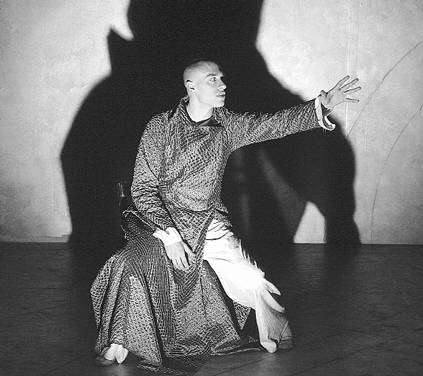Looking for love in all the wrong places
Psychosis has never seemed so seductive than in the magnificent, one-person show “In Delirium: After The Sorrows of Young Werther.” Adapted from the Goethe novel by Gisela Cardenas and Joshua Randall, this is the kind of theater one longs for but so seldom sees. It is a fully integrated, tightly constructed 65 minutes that leads us into a world of Wether’s mind and his ultimate tragedy. The stunning staging by Cardenas and the breathtaking and powerful performance by Randall achieve a kind of beauty, for all the darkness of the material, that makes this a rich and exhilarating piece of art. Designed by Jian Jung, a mostly bare stage has never been so striking, and Cardenas divides the space using just Randall’s body and a chair to create an unrelenting tension that is sublime and often dance-like. Randall in the role of the lovesick and increasingly deranged Werther is, simply, brilliant. He is centered, focused, and always in control as the character becomes unhinged. The beauty of the language, the artistic vision, and the performance are awe-inspiring. It is the kind of daring, risk-taking theater that, dark as it is, brightens the soul.
Sex, isolation, alcohol, and angst have been the staples of gay theater since “The Boys in the Band.” Can there be anything at all new to say on these topics? Astonishingly, the answer is “yes,” at least in the case of the compelling and gently exciting “33 to Nothing,” a play with music by Grant James Varjas.
Looking at these two plays in contrast shows us, in fact, how far we’ve come. Whereas Mart Crowley in his seminal work wrote about gays as being a world apart, Varjas’ straight and gay characters share the stage easily, the neuroses and longings that drive them are virtually identical. Disillusion and the pain of finally growing up are—gasp—unrelated to sexual orientation. That’s one way of arriving in the mainstream. Being gay is still, at least initially, a symbol of arrested development, which is easy, conventional homo-dramaturgy, but Varjas is a clever playwright who has no need to equate pathology with sexuality; he’s about something bigger and more reflective of our current culture: What happens when our dreams, fantasies and created identities no longer serve us?
Varjas plays this against the backdrop of the breakup of a marginally surviving rock group and the end of a relationship between lead singer Gray and guitarist Bri as the other members of the band, a married couple Alex and Tyler who have decided to leave and Barry, the emotionally stuck drummer, look on. It’s a trenchant symbol for our culture, which suggests that fame and riches are just around the corner. Crowley suggested that the intrusion of straights into the gay world, rocked the delicate balance of illusion that sustained the gay men’s alternate universe. Varjas, more simply, and quite movingly suggests we all need to grow up, that our need to connect with the world and one another requires telling a level of truth that comes hard, but is essentially liberating. When the dream becomes a prison, it’s time to move on, but it takes an adult to recognize that.
Varjas plays Gray with wonderful depth, aided by strong performances from Preston Clarke as Bri, Amanda Gruss as Alex, John Good as Tyler, and Ken Forman as Barry.
One play is not a trend, but the defining drama based on humanity rather than sexuality is always welcome. What we lose in cute boys in underpants, we gain in sensitivity, engagement, and truth.
Bulrusher,” which just ended its run at Urban Stages, is a lyrical and often compelling new play about finding one’s identity in the various contexts and roles in which one experiences life. The character Bulrusher is a mixed race foundling girl, saved from a river, and raised in the town of Boonville, California in 1955. Playwright Elisa Davis says in a program note that she chose the time because it is the summer when Emmett Till was murdered, the event she says led to the Civil Rights Movement.
What works in the play is the sense of hope and innocence Bulrusher brings to her world, particularly as she discovers her lesbianism when she meets Vera, a pregnant young woman who has come to Boonville from Jim Crow Alabama. At its heart, this tender story is poetic and moving, beautifully rendering the humanity and heart beneath racial division, and Zabryna Guevara gave an astonishing performance as Bulrusher that is simple, present, and wonderfully human. Tinasha Kajese as Vera matched her point for point, and the scenes between the two women were the high points of the play.
What doesn’t work is the sort of willful naiveté of the playwright in assuming that Bulrusher, her town, and adopted family could really be so separated from the world and that she would live in a world where racial distinctions are not made. The unique language of Boonville—so abstract there’s a vocabulary sheet in the program—that peppers the play, a kind of Native American patois unique to the location, tends to seem precious rather than dramatically integrated. We are supposed to be in a world apart as defined by the language, but the world seems two-dimensional, serving the playwright’s design rather than an organic drama.
Still, there was poetry enough in Leah C. Gardiner’s direction, and the theme of water for healing, baptism, and carrying us into the unknown is intriguing and made for a satisfying, if uneven, evening.
gaycitynews.com



































